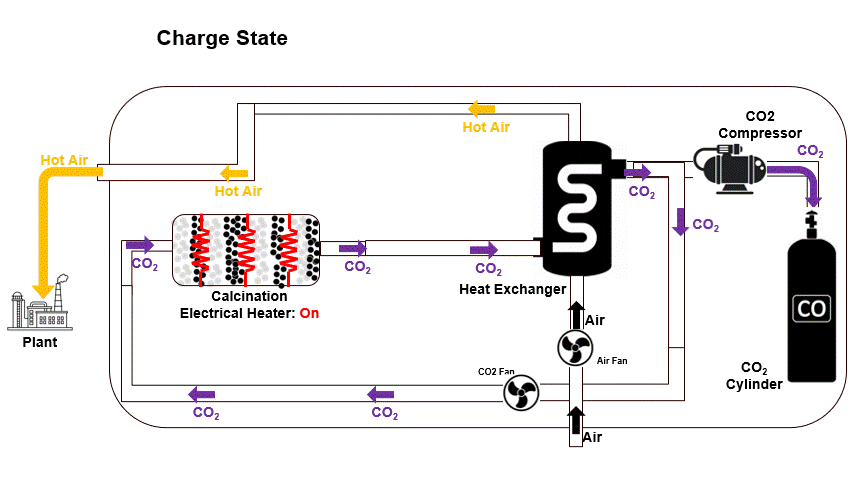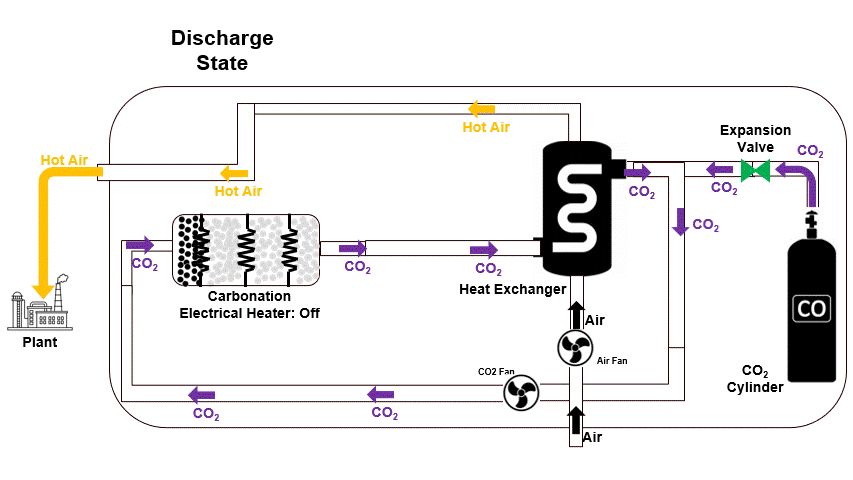
Modular Carbon Heat Battery
Remedium is developing a ground-breaking heat battery that stores electricity as chemical energy.
Problem we are solving
Industrial sectors such as cement, steel, and chemicals rely heavily on high-temperature heat (above 600°C) for their processes, which is predominantly supplied by fossil fuels. This dependence results in significant CO₂ emissions, making industrial heat one of the hardest sectors to decarbonize. While renewable energy sources like solar and wind are becoming more prevalent, they are intermittent and unable to provide consistent high-temperature heat on demand.
Existing energy storage solutions, such as batteries, are not designed for cost-effective, long-duration high-temperature heat storage at an industrial scale. Without a viable solution, industries face the challenge of either continuing their reliance on fossil fuels or operating inefficiently with fluctuating energy inputs. This gap highlights the urgent need for a scalable, cost-effective high-temperature heat battery that can store and dispatch energy reliably, enabling industries to transition away from fossil fuels while maintaining operational efficiency and reducing emissions.
How carbon heat battery works
To store electricity, it must be converted into a storable form, typically gravitational, chemical, thermal, or mechanical energy, through a reversible process. In the Carbon Heat Battery charging cycle, electricity is converted into chemical energy via a thermochemical reaction. Available electricity powers an electric heater that heats CO₂, driving the calcination of Limeloop, which releases additional CO₂ that is compressed and stored onboard.
During discharge, the stored CO₂ is released and reacts with the calcined Limeloop, generating high-temperature heat. This heat can be utilized directly for industrial applications or potentially converted back into electricity using a steam turbine, enabling a flexible and efficient energy storage solution for decarbonizing industrial processes.


Why you should choose our solution

Our novel material, Limeloop, enables significantly higher energy storage density due to its high CO₂ uptake capacity and the use of chemical energy storage rather than latent or sensible heat storage, which have notably lower energy densities. By leveraging a thermochemical process, we can store and release heat more efficiently, making our solution more compact, scalable, and cost-effective for industrial applications.
Remedium's Modular Carbon Heat Battery (MCHB), is a scalable heat storage solution designed for industrial applications. Available in two sizes—20 ft units with 7-8 MWh capacity and 40 ft units with 15-20 MWh capacity—MCHB offers a compact and cost-effective solution for high-temperature heat storage.
Key Advantages of MCHB:
-
Exceptional Economic Value: Techno-economic analysis shows that a 20 ft unit achieves a payback period of just 7 months.
-
Compact Design: By storing heat as chemical energy, MCHB achieves greater energy density than sensible or latent heat storage systems. The 20 ft unit provides 7-8 MWh of storage compared to less than 5 MWh offered by competing technologies of similar size.
-
Long Duration Storage with Minimal Self-Discharge: Approximately 50% of stored heat is retained as chemical energy, ensuring efficient heat recovery even after months of storage.
-
High-Temperature Heat Supply: MCHB can deliver heat at 900°C, suitable for industries such as cement, petrochemical, oil & gas, and paper.
-
Modular Design for Flexible Deployment: MCHB's modularity simplifies scaling and allows units to be easily transported and integrated at different locations.
-
Efficient Energy Conversion: MCHB achieves a coefficient of performance (COP) above 80%, converting 80% of electrical input into high-temperature heat.
-
Flexible Solutions for Different Needs: Customers can choose between 20 ft or 40 ft units depending on their heat demand.
-
Environmental Benefits: Each unit can prevent up to 500 tonnes of CO₂ emissions annually, equivalent to removing over 100 passenger cars from the road.
-
Enhanced Safety: Unlike lithium-ion batteries where liquid electrolyte is typically flammable, MCHB avoids the use of combustible gases or corrosive materials, ensuring a safer storage solution.
-
Cost-Effective Materials: MCHB utilizes limestone, an inexpensive and abundantly available material, avoiding supply chain challenges faced by lithium-ion batteries.
